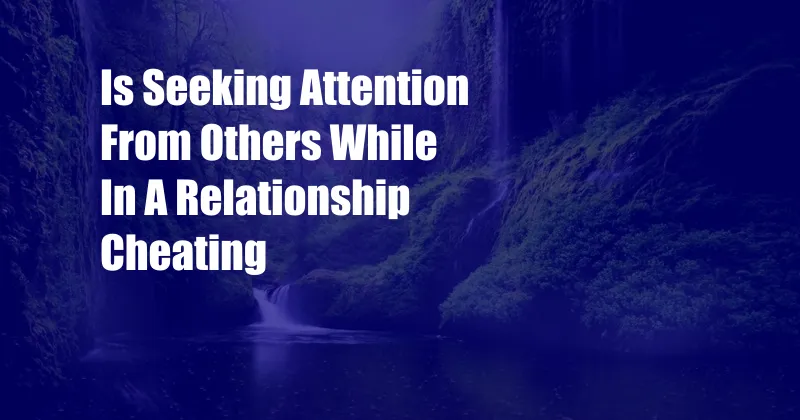
Is Seeking Attention from Others While in a Relationship Cheating?
In the labyrinthine realm of relationships, the boundaries of fidelity can be both explicit and nuanced. One gray area that has sparked countless debates is whether seeking attention from others while in a committed partnership constitutes infidelity. While the answer may vary depending on individual perspectives and the specific circumstances involved, it’s essential to approach this topic with empathy, understanding, and a critical analysis of the emotional dynamics at play.
To delve deeper, we’ll explore the multifaceted nature of attention-seeking behavior, its potential impact on a relationship, and the nuances that shape our understanding of faithfulness. By examining real-life experiences, expert insights, and societal norms, we aim to shed light on the complexities surrounding this controversial topic.
The Nature of Attention-Seeking Behavior
Attention-seeking behavior encompasses a range of actions aimed at garnering the focus or admiration of others. In the context of a relationship, it can manifest in various ways, from flirting and seeking validation outside the partnership to engaging in excessive social media posting or attention-grabbing behaviors.
While attention-seeking can be a natural desire for human connection, it’s important to consider the underlying motivations and potential consequences of such actions. In some cases, attention-seeking behavior may stem from a lack of self-esteem or a desire to compensate for unmet needs within the relationship. Alternatively, it may be a symptom of deeper emotional issues that require professional attention.
Impact on the Relationship
The impact of attention-seeking behavior on a relationship can be significant, ranging from feelings of insecurity and jealousy to a breakdown of trust. When one partner feels neglected or threatened by their partner’s attention-seeking actions, it can create a sense of emotional distance and resentment.
Additionally, attention-seeking behavior can erode the exclusivity and intimacy that are cornerstones of healthy relationships. If one partner perceives their partner as seeking attention elsewhere, it can undermine their sense of security and lead to feelings of betrayal. This can, in turn, trigger negative communication patterns, power struggles, and a loss of connection.
Nuances of Faithfulness
The definition of faithfulness varies widely across cultures and individuals. For some, fidelity is solely defined by physical acts, while for others, it encompasses emotional and intellectual boundaries as well.
In the context of attention-seeking behavior, it’s essential to consider whether the actions are intended to harm or deceive the partner. If attention-seeking is done with the intention of creating emotional intimacy or seeking validation outside the relationship, it may be considered a form of infidelity. However, if it’s done without malicious intent and with the knowledge and consent of the partner, it may not be perceived as a betrayal.
Tips and Expert Advice
Navigating the complexities of attention-seeking behavior in a relationship requires empathy, communication, and a willingness to address underlying issues. Here are some tips and expert advice to help couples approach this topic with sensitivity and understanding:
- Communicate openly and honestly: Talk to your partner about your feelings and concerns regarding their attention-seeking behavior. Explain how it affects you and explore the underlying reasons why they may be seeking attention elsewhere.
- Set clear boundaries: Establish mutually agreed-upon boundaries regarding attention-seeking behavior. Discuss what types of actions are acceptable and which are not. Respect each other’s boundaries and hold yourselves accountable for your actions.
- Seek professional help if needed: If you’re struggling to resolve attention-seeking issues on your own, consider seeking support from a therapist or counselor. They can provide an objective perspective and guide you in developing healthy coping mechanisms.
Remember, every relationship is unique, and there’s no one-size-fits-all solution to addressing attention-seeking behavior. The key is to approach the situation with compassion, empathy, and a willingness to work together to find a solution that respects both partners’ needs and values.
FAQ
- Q: Is attention-seeking behavior always a sign of infidelity?
A: Not necessarily. Attention-seeking behavior can have various motivations, not all of which are harmful to a relationship. - Q: How can I tell if my partner’s attention-seeking behavior is intended to be harmful?
A: Consider whether their actions are secretive, deceptive, or intended to create emotional intimacy or validation outside the relationship. - Q: What should I do if I feel insecure or threatened by my partner’s attention-seeking behavior?
A: Communicate your feelings to your partner in a non-accusatory way. Explain how their actions affect you and work together to establish clear boundaries.
Conclusion
Whether seeking attention from others while in a relationship constitutes cheating is a complex question that cannot be answered with a simple yes or no. The definition of faithfulness, the specific actions involved, and the underlying intentions of the individual all play a role in determining whether such behavior is considered a violation of trust.
Ultimately, the most important factor is open and honest communication between partners. By discussing expectations, setting clear boundaries, and addressing any underlying emotional issues, couples can navigate the challenges of attention-seeking behavior and strengthen their relationship.
Are you interested in learning more about the topic of seeking attention outside of a relationship?